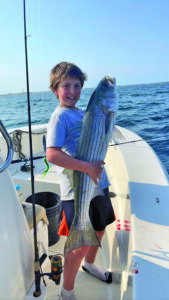Some very big striped bass have moved into our area with several fish in excess of 40 inches being caught and released. Capt. Dave of the Ginny G got into some big bass in deep water just past Long Point off the Twin Hills. The next day Capt. Vaughn Cabral on his private boat brought in the biggest striped bass he has ever caught — a 49-inch fish — right in the harbor behind the breakwater. Then Capt. Noah Santos of TowBoat U.S.A. and his three sons, Myles, Max, and Mason, each got monster bass as well; they measured 42, 44, and 45 inches, respectively.

In the past few years, we have not generally seen bass that big here, especially this early in the season. But they are here now, and they are hungry and biting. Fresh mackerel bait and vertical jigs have been the ticket to success; oddly enough, swimming plugs have not produced like they normally do early in the season.
There are massive schools of pogies from the harbor out to Wood End. You can’t miss them: they appear on the surface as huge dark patches accompanied by pitter-patter splashing on the water’s surface. The bass are often right below them. There are also mackerel virtually everywhere, but particularly in the west end of our harbor.
The other day on the Cee-Jay, my passengers had an unexpected treat as we watched a juvenile humpback whale in the harbor at Long Point. The whale lunged, feeding, through three enormous schools of pogies.
There are credible reports of bluefish already in Cape Cod Bay and a few have been taken along the south shore of the Cape. During the week, water temperatures crept up to that magical 60-degree mark, which is when things start to percolate at a faster pace. But a very unusual winter-like nor’easter blew through here beginning Saturday and lasted until Monday.
Although we did not get much of the rain that the stay-home-and-garden folks needed out of it, we had unrelenting winds of up to 40 miles per hour. This weather system put a screeching halt to all beach and waterfront commercial offerings, as sea conditions were far too inhospitable for whale watching, fishing, and all other summertime activities on the water. Even the large high-speed ferries from Boston canceled their trips to Provincetown.
What this storm also did was bring surface seawater temperatures right back down into the low 50s. It’s hard to say exactly what short-term effect this will have on fishing because, as I write this, no one has been out for a few days. The biggest concern is how this affects the presence of sand eels, pogies, and mackerel — these are the food source of our striped bass and bluefish. If the dip in water temperature shifts them away from our area, the bigger fish will follow them.
We were off to a terrific start of the recreational fishing season — so here’s hoping we will find out very soon that things have rebounded.



